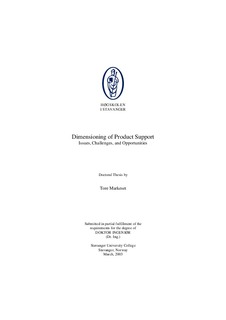| dc.contributor.advisor | Kumar, Uday | |
| dc.contributor.author | Markeset, Tore | |
| dc.date.accessioned | 2016-09-30T08:26:58Z | |
| dc.date.available | 2016-09-30T08:26:58Z | |
| dc.date.issued | 2003-03 | |
| dc.identifier.citation | Dimensioning of Product Support : Issues, Challenges, and Opportunities by Tore Markeset. Stavanger Universiy College, 2003. | nb_NO |
| dc.identifier.isbn | 82-7644-197-1 | |
| dc.identifier.issn | 1502-3877 | |
| dc.identifier.uri | http://hdl.handle.net/11250/2412136 | |
| dc.description | PhD thesis in Offshore Technology | nb_NO |
| dc.description.abstract | The research study examines issues related to dimensioning of product support strategies for
advanced industrial products on the basis of a case study conducted in a manufacturing company that
produces automated production line systems. The focus is mainly on investigating engineering
factors/parameters that influence product support.
Product support can be defined as any form of assistance that companies offer their customers to
gain maximum value from manufactured products. In general, it creates additional value/profit for
the product owner as well as for the manufacturer. It can be broadly classified into two, namely,
services to support product and services to support customers. Services to support the product are
mainly dependent on the product’s designed-in characteristics, operational environment, as well as
on owner’s operational, maintenance, and support strategies. Services to support the customer are
influenced by customer characteristics related to operational and maintenance skills and
capabilities. Dimensioning of product support is influenced by the product’s designed-in
characteristics – especially those characteristics related to RAMS (Reliability, Availability,
Maintainability and Supportability).
Within the scope of the case study, various approaches and methods to integrate RAMS in combination
with LCC (Life Cycle Costs) in design work processes to arrive at the most cost effective product
support strategy for industrial systems and components is examined. Often a considerable amount of
information and data about product failures/weaknesses and product RAMS characteristics is
available in various databases. Unfortunately, these information sources/databases are not usually
integrated with work processes in design, and thus these cannot be used for dimensioning of product
support effectively. An approach for integrating RAMS information into design processes is
suggested.
Furthermore, various aspects of product support strategies for functional products where the
customer buys only the performance, not the physical product is studied and analyzed. In the
conventional product scenario, the manufacturer benefits from
selling support services, whilst this profit generating process becomes a cost and liability in the
functional product scenario. Based on this study it is concluded that the product support strategy
for functional products will differ considerably compared to that for the conventional product.
Moreover, it is shown that the service delivery strategy of the manufacturer or service provider
must be in line with the service reception strategy of users/customers. The study also provides a
critical view on the role of the negotiation process in the development of cost effective and
competitive service delivery strategies. In addition, there exists a need to involve personnel who
are involved in the support services as well as in manufacturing, assembly, and quality assurance,
etc. processes in the design process to arrive at the best strategy for product support.
The scope of the thesis is limited to studying the relationship between a manufacturer of advanced
industrial products and customers using those products in production lines. Furthermore, this
thesis is limited to investigating engineering aspects of support services. Implications of the
research open up research areas related to product support strategies, functional products, as
well as to development of
methods for integrating RAMS information in design work processes. | nb_NO |
| dc.language.iso | eng | nb_NO |
| dc.publisher | Stavanger University College, Norway | nb_NO |
| dc.relation.ispartofseries | PhD thesis UiS; | |
| dc.relation.haspart | Markeset, T. and Kumar, U. (2001). “R&M and Risk Analysis Tools in Product Design to Reduce Life-Cycle Cost and Improve Product Attractiveness”, In: Proceedings of The Annual Reliability & Maintainability Symposium, Jan 22-25, Philadelphia, USA: 116-122. | nb_NO |
| dc.relation.haspart | Markeset, T. and Kumar, U. (2003). “Integration of RAMS and Risk Analysis in Product Design & Development Work Processes”. Accepted for publication in Journal of Quality in Maintenance Engineering (2003). | nb_NO |
| dc.relation.haspart | Markeset, T. and Kumar, U. (2003). “Integration of RAMS Information in Design Processes – A Case Study”, In: Proceedings of The Annual Reliability & Maintainability Symposium, Jan 27-31, Tampa, Florida, USA: 220-225. | nb_NO |
| dc.relation.haspart | Markeset, T and Kumar, U. (2003). “Design and Development of Product Support & Maintenance Concepts for Industrial Systems”. Accepted for publication in Journal of Quality in Maintenance Engineering (2003). | nb_NO |
| dc.relation.haspart | Markeset, T, and Kumar, U. (2003). “Study of Product Support Strategy: Conventional versus Functional Products”. Accepted for publication in Journal of Quality in Maintenance Engineering (2003). | nb_NO |
| dc.relation.haspart | Kumar, R., Markeset, T. and Kumar, U. (2003). “Negotiation of Product Support and Service Delivery Agreements in a Multinational Environment”. | nb_NO |
| dc.rights | Navngivelse 3.0 Norge | * |
| dc.rights.uri | http://creativecommons.org/licenses/by/3.0/no/ | * |
| dc.subject | product support | nb_NO |
| dc.subject | offshore teknologi | nb_NO |
| dc.subject | RAMS | nb_NO |
| dc.title | Dimensioning of Product Support : Issues, Challenges, and Opportunities | nb_NO |
| dc.type | Doctoral thesis | nb_NO |
| dc.subject.nsi | VDP::Technology: 500::Materials science and engineering: 520 | nb_NO |

